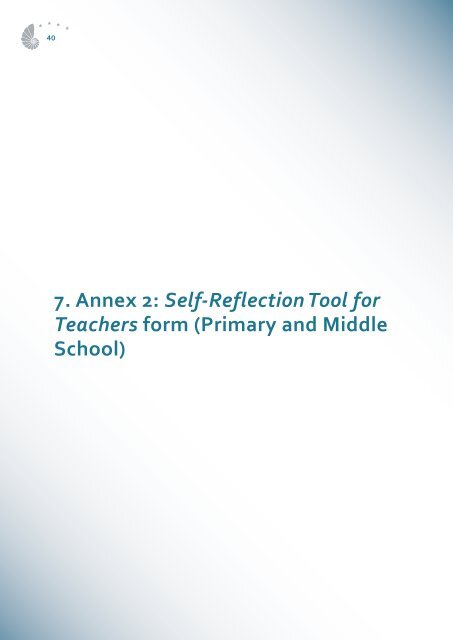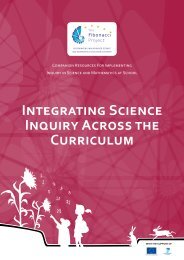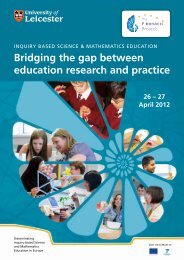Tools for Enhancing Inquiry in Science Education - Fibonacci-Project
Tools for Enhancing Inquiry in Science Education - Fibonacci-Project
Tools for Enhancing Inquiry in Science Education - Fibonacci-Project
Create successful ePaper yourself
Turn your PDF publications into a flip-book with our unique Google optimized e-Paper software.
4041Self-Reflection Tool <strong>for</strong> Teachers – Primary and Middle SchoolSection A: The Teacher's RoleItems(T = teacher; Ps = pupils)Examples of good practise Decision Notes1. Build<strong>in</strong>g on Ps' ideas1a Did you ask questions to revealand show <strong>in</strong>terest <strong>in</strong> Ps ideas?1b Did you help Ps to express theirideas clearly?1c Did you give Ps positivefeedback on how to review or taketheir ideas further?You phrased questions such as ‘what do you th<strong>in</strong>k is happen<strong>in</strong>g?’ ‘why doyou th<strong>in</strong>k this might be?’ rather than ‘what is the reason?’ or ‘why is thishappen<strong>in</strong>g?’You gave Ps time to th<strong>in</strong>k about how to express their ideas so that otherscould understand them; perhaps by giv<strong>in</strong>g a short time <strong>for</strong> discussion <strong>in</strong>pairs or small groups, or you repeated what they said and asked ‘Is thiswhat you mean?’You may have suggested how Ps’ ideas could be <strong>in</strong>vestigated at some stage<strong>in</strong> the current activity or later; you may have referred to their ideas <strong>in</strong> laterdiscussion ask<strong>in</strong>g ‘ do you still th<strong>in</strong>k that…?’yes no NAyes no NAyes no NA2a Did you encourage Ps to askquestions?You asked them, <strong>for</strong> <strong>in</strong>stance, ‘What would you like to know about…?’ Orprovided a ‘question box’ or board where Ps could post their questions.yes no NA7. Annex 2: Self-Reflection Tool <strong>for</strong>Teachers <strong>for</strong>m (Primary and MiddleSchool)2. Support<strong>in</strong>g pupils' own <strong>in</strong>vestigations2b Did you help them <strong>for</strong>mulateproductive (<strong>in</strong>vestigable)questions?2c Did you ask them to makepredictions?2d Did you <strong>in</strong>volve them <strong>in</strong>plann<strong>in</strong>g <strong>in</strong>vestigations?2e Did you encourage them to<strong>in</strong>clude fair test<strong>in</strong>g whereappropriate?2f Did you ask them to check theirresults or observations?2g Did you help them to keepnotes and record resultssystematically?This might be through discuss<strong>in</strong>g the k<strong>in</strong>ds of questions that can lead to<strong>in</strong>vestigation and which <strong>in</strong>clude an <strong>in</strong>dication of what to do and what tolook <strong>for</strong> <strong>in</strong> order to answer it (i.e.: clarify the mean<strong>in</strong>g of words such as‘best’ <strong>in</strong> a question such as ‘which is the best shape <strong>for</strong> a paper aeroplane?’)yes no NAAt some stage of discuss<strong>in</strong>g an <strong>in</strong>vestigation you asked Ps ‘What do youth<strong>in</strong>k will happen if … or when…? Why do you th<strong>in</strong>k that?"yes no NAPerhaps you provided a plann<strong>in</strong>g framework, or discussed with Ps thepossible steps <strong>in</strong> the <strong>in</strong>vestigation, ask<strong>in</strong>g <strong>for</strong> their ideas <strong>in</strong> relation to partsof the plan so that they regarded it as their own and not planned entirely byyou.In <strong>in</strong>vestigations where comparisons were be<strong>in</strong>g made you prompted themto th<strong>in</strong>k about what has to be kept the same and what had to be changedso that only the variable under <strong>in</strong>vestigation was changed.You asked Ps to check their results by repeat<strong>in</strong>g their observation ormeasurements where possible and ensur<strong>in</strong>g accuracy, <strong>for</strong> <strong>in</strong>stance <strong>in</strong>read<strong>in</strong>g measurement scales carefully.This might be through show<strong>in</strong>g Ps how to organise data <strong>in</strong> a table orsuggest<strong>in</strong>g a list of head<strong>in</strong>gs or a checklist of items to be <strong>in</strong>cluded <strong>in</strong> theirreport.yes no NAyes no NAyes no NAyes no NA3a Did you ask Ps to provide someconclusions from their work?This might be by help<strong>in</strong>g Ps to make some general statement about whatthey found rather than only list<strong>in</strong>g <strong>in</strong>dividual f<strong>in</strong>d<strong>in</strong>gs; <strong>for</strong> <strong>in</strong>stance aboutthe factors that were found to make a difference, not just the differencebetween one condition and another.yes no NA3. Guid<strong>in</strong>g analysis and conclusions3b Did you ask Ps to check thattheir conclusions were consistentwith their results?Where Ps gave a conclusion, you asked them to be sure that it fitted alltheir observations or results.yes no NA3c Did you ask Ps to compare their You asked Ps to recall what they predicted and to compare this with theiryes no NAconclusions with their predictions? conclusions.3d Did you ask Ps to th<strong>in</strong>k ofreasons or explanations <strong>for</strong> whatthey found?3e Did you ask Ps to identifypossible sources of error?Whether or not there was agreement with predictions, you encouraged Psto try to expla<strong>in</strong> what was found and develop their understand<strong>in</strong>g of theevents or phenomena <strong>in</strong>vestigated (i.e., by help<strong>in</strong>g them to use an idea thatcould also expla<strong>in</strong> other situations).You discussed with Ps whether some aspects of the way the <strong>in</strong>vestigationwas carried out could have affected the result, perhaps by ask<strong>in</strong>g if theywould get exactly the same result if repeated.yes no NAyes no NA3f Did you ask Ps to identifyfurther questions?You encouraged Ps to cont<strong>in</strong>ue to <strong>in</strong>quire, perhaps by discuss<strong>in</strong>g otherquestions that arose or ask<strong>in</strong>g ‘what else would you like to f<strong>in</strong>d out about…?’yes no NA3g Did you encourage Ps to reflecton what they found and how theyfound it?You spent some time after the <strong>in</strong>vestigation help<strong>in</strong>g Ps to recall what theyhad done, discuss what they had learned, how they could improve their<strong>in</strong>vestigation and apply this <strong>in</strong> future work.yes no NAPLEASE READ THE INSTRUCTIONS CAREFULLY BEFORE USING THIS TOOL




